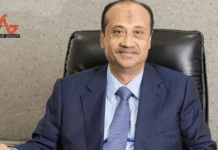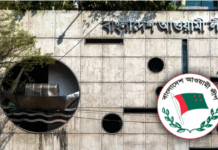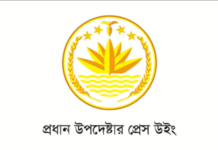At least one killed and dozens injured after Jamaat-e-Islami supporters clash with police over war crimes trials.
Police in Bangladesh’s capital, Dhaka, have fired tear gas to disperse thousands of supporters of Islamic parties protesting against a war crimes trial linked to the country’s 1971 independence war.
Parts of central Dhaka turned into a battlefield as protesters attacked police with bricks and sticks in front of the national mosque after Friday prayers.
The security forces responded with hundreds of rounds of rubber bullets and tear gas shells, according to witnesses.
Police tried to thwart the protest by locking the gates of the Baitul Mukarram mosque where thousands of people were performing their weekly prayers, an AFP photographer at the scene said.
At least one person has been killed and more than 100 injured, including policemen and journalists, after protesters pelted stones and tried to overrun police barricades, the Dhaka-based English newspaper, the Daily Star, reported.
Fierce clashes also occurred in the port city of Chittagong, the northern city of Bogra and dozens of other cities and towns where police fired rubber bullets at thousands of protesters, leaving scores injured, police and local media said.
Sayeed Khan, an emergency doctor at Dhaka medical college hospital, told AFP that up to 50 people had been admitted, most injured by rubber bullets.
“Several cases are very critical,” he said.
Twelve Islamic parties called the protests after the weekly prayers in nearly half a million mosques nationwide, demanding punishment to pro-government protest organisations for their alleged anti-Islamic blogs.
‘Politically motivated’
Earlier this month, a special tribunal convicted senior party leader, Abdul Quader Mollah, of mass killings during the war and sentenced him to life in prison.
Another eight leaders of the party are on trial on charges of atrocities during the nine-month war against Pakistan.
Mollah’s life sentence was seen by many in the country as lenient, which triggered a mass protest.
In its first verdict last month, the tribunal sentenced a former Jamaat-e-Islami leader, Abul Kamal Azad, to death in absentia for similar offences.
Tens of thousands of people came out on the streets across the country calling for the death penalty for convicted war criminals, including Mollah.
They have since been camping at Shahbagh in the centre of Dhaka to press for their demands.
Members of Jamaat-e-Islami say the war tribunal verdicts were politically motivated and have sought for the trials be held under the auspices of the UN.
Bangladesh’s parliament, meeting the demands of protesters, this week amended a law allowing the state to appeal any verdict in war crimes trials it deemed inadequate and out of step with public opinion.
Source: Al Jazeera









